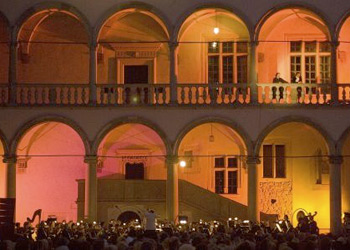Annual Opera Festival Strikes a Chord
Opera lovers have a banquet in store this summer, but Michał Grudziński, organisational director of the Krakow Opera, believes that first timers will also find inspiration at the upcoming festival:
KP: After almost half a millennium, Krakow finally has its own opera house. Are you enjoying this new-found independence?
Our own building means above all a sense of our own worth, as well as a greater faith in the artistic and organisational possibilities of the Krakow Opera. We’re no longer a group scattered across various venues all around Krakow, where the choir, ballet, orchestra, soloists, and the studio are all rehearsing in different places. Now we work together artistically as a team. Nonetheless, we still sometimes miss our friends from the Słowacki Theatre.
KP: Do you think that Krakow has the chance to become a beacon for the art of opera in Poland?
Krakow is a unique city. It’s a leader in many types of events and cultural institutions, not only in Poland but also in Europe. My wish is that in the next five years the Krakow Opera joins the list of the most interesting offerings on Poland’s cultural map, becoming a place regularly visited by guests from Poland and abroad. Our team of artists, as well as our ambitious plans, which can now be achieved on the modern stage of our own building, create the foundations for this to happen.
KP: The Summer Opera Festival is now in its 13th year. Are there any events in this edition that you are especially excited about?
The events for this year’s festival will take place in two specific areas of Krakow – in the new Krakow Opera building and in the arcaded courtyard of the Royal Castle on Wawel Hill. I would have to recommend all items on the festival’s repertoire, in order to honestly inform our audience of the attractiveness of our programme. You cannot, however, miss the following five events: on June 12, as part of the Night of Theatre, we invite you to the Krakow Opera for the Nightly Operetta Benefis; on 26 and 27 June we will hold two open-air performances of Rossini’s The Barber of Seville at Wawel, while on the 29 June and 1 July we will have two foreign theatre groups from the Czech Republic and Slovakia in the new building of the Opera, presenting the outstanding works of Puccini: Gianni Schicchi, Suor Angelica and Madame Butterfly; but at the end of the Festival on the 3, 4 and 5 July we will present in the courtyard of Wawel three exceptional galas of the most beautiful arias and duets of the operatic world.
KP: This summer, Krakow will see many foreign visitors of all ages. Why do you think that younger guests should be persuaded to try opera?
Because the art of opera is not just an emotional portrayal of the most important values of human life, but also a presentation that overcomes cultural, linguistic and social boundaries. In the beautiful music and spectacular images all can find comfort and inspiration. I am convinced that today’s young people are also looking for these very emotions, and it is precisely during the performances in the Krakow Opera that they can find them.
KP: Why is opera still relevant in the twenty-first century?
In a sense, I already answered this question in the previous one. The timelessness of an opera is derived from its indisputable beauty. And if the performance, which is a combination of music, scenery, acting, choreography, lights, costumes and stage movement can move or entertain viewers in the same way today as they did a few centuries ago, it testifies to something. I assure you that every performance and concert in the Krakow Opera has something for everyone.
KP: The final spectacles will be at the Royal Castle. Which of Poland’s monarchs would have most enjoyed the show?
The Barber of Seville should have entertained both Mieszko I and Bolesław the Brave, although I suspect that the wide-ranging matrimonial intrigues contained in this opera could just dissuade both rulers. The “Operas of the World Arias” concerts in turn are dedicated to Zygmunt III Waza, so he could be made aware of what he lost by moving the capital from Krakow to Warsaw.
The Summer Opera Festival runs from 12th June until 5th July. A full programme can be found at www.opera.krakow.pl

